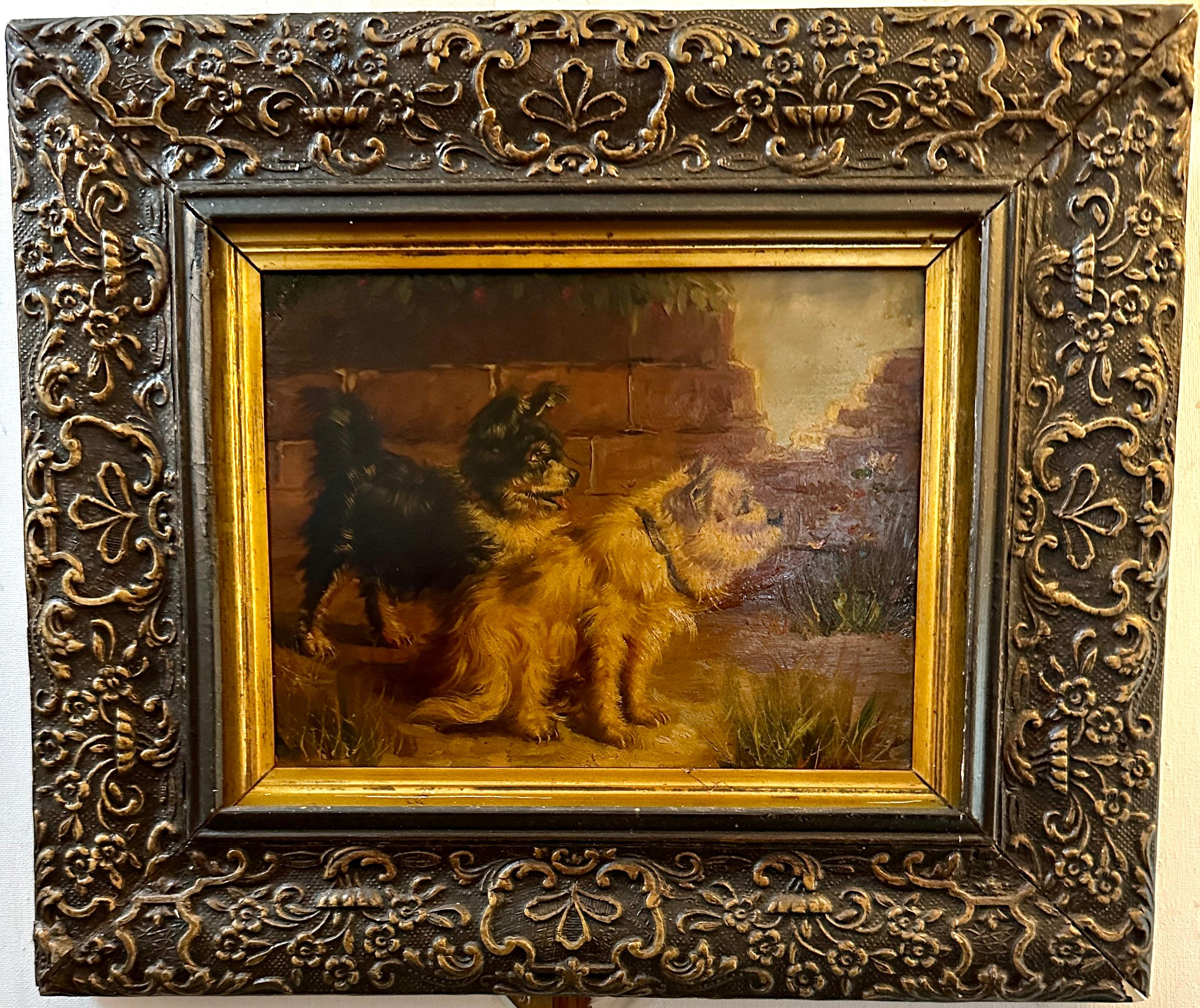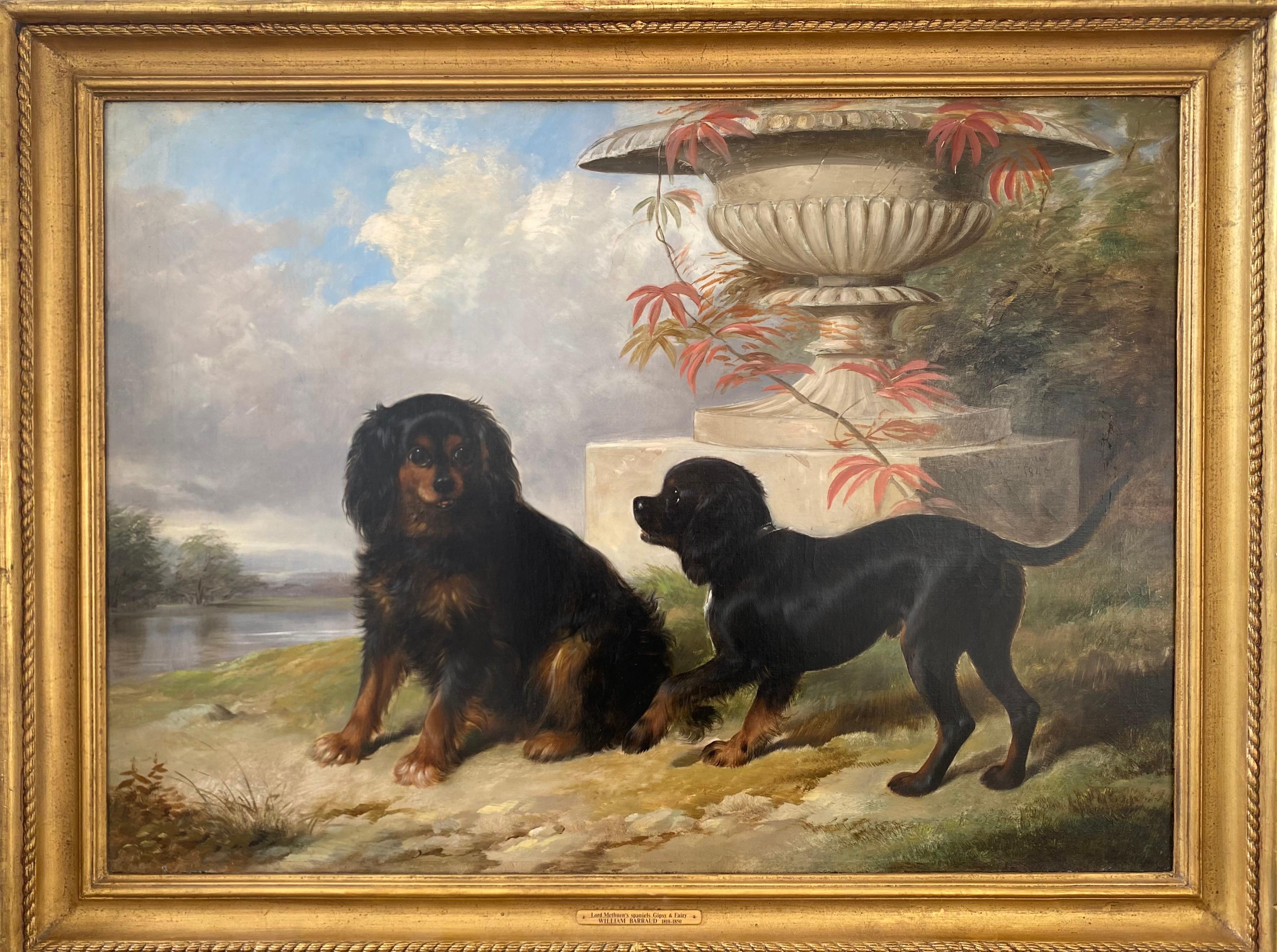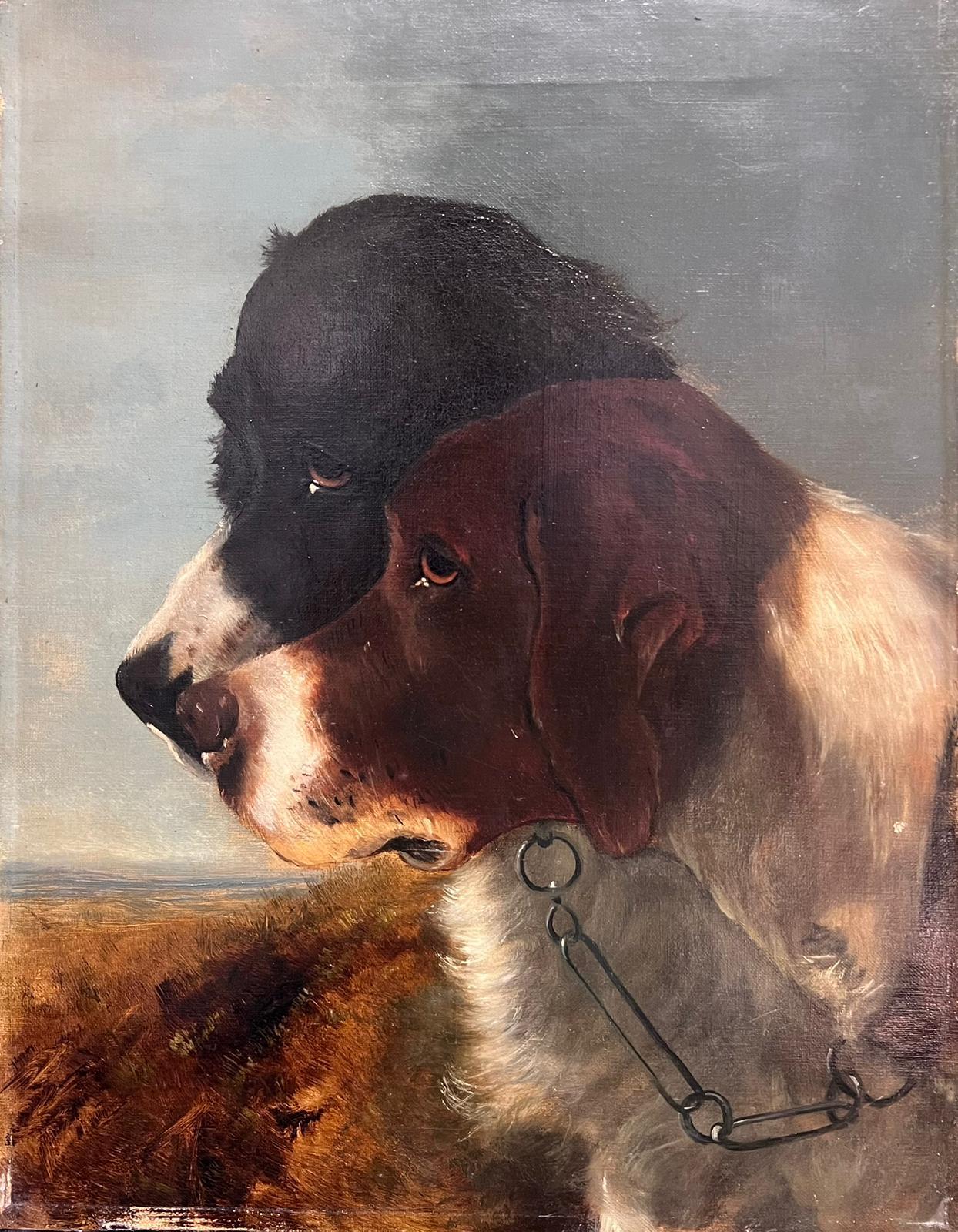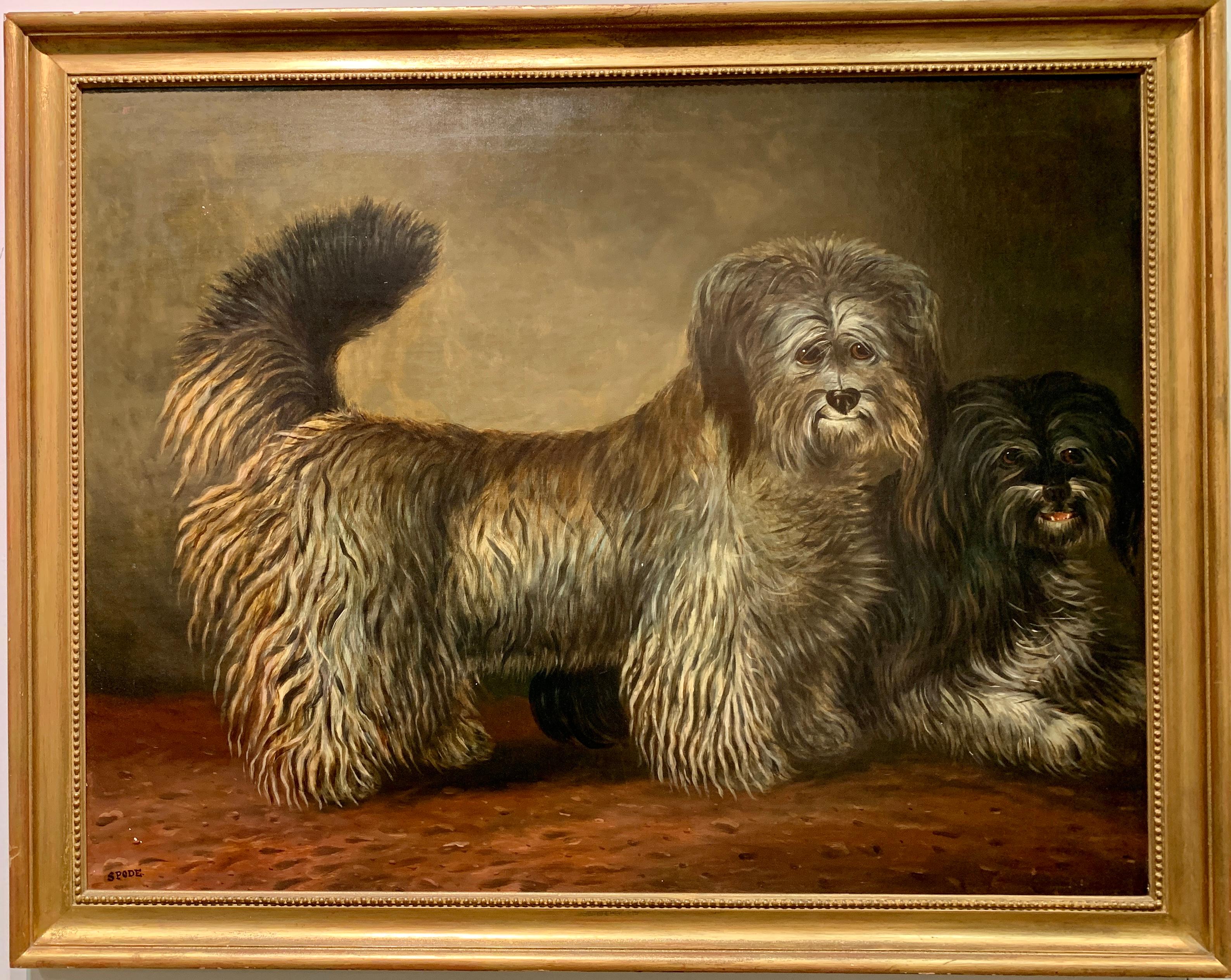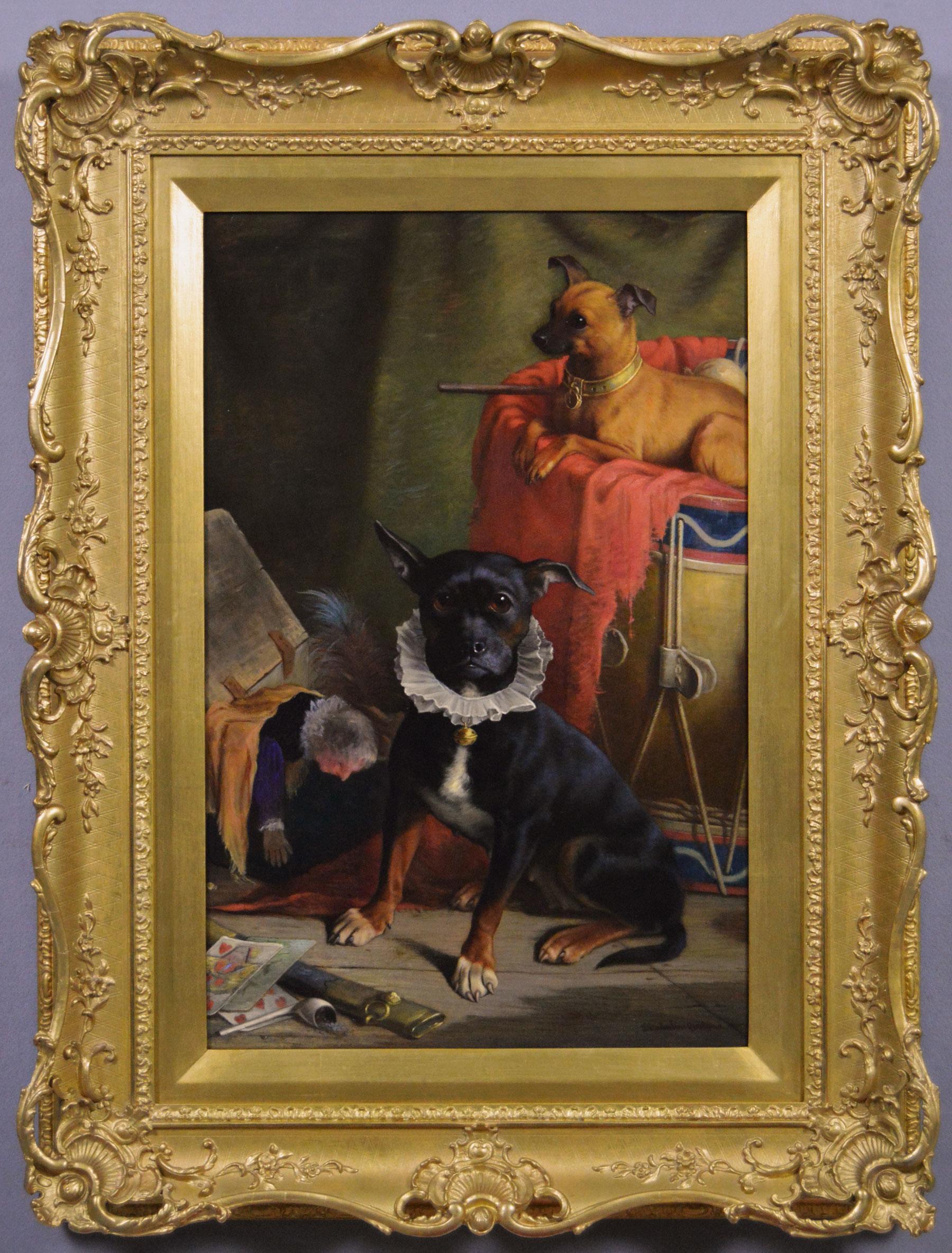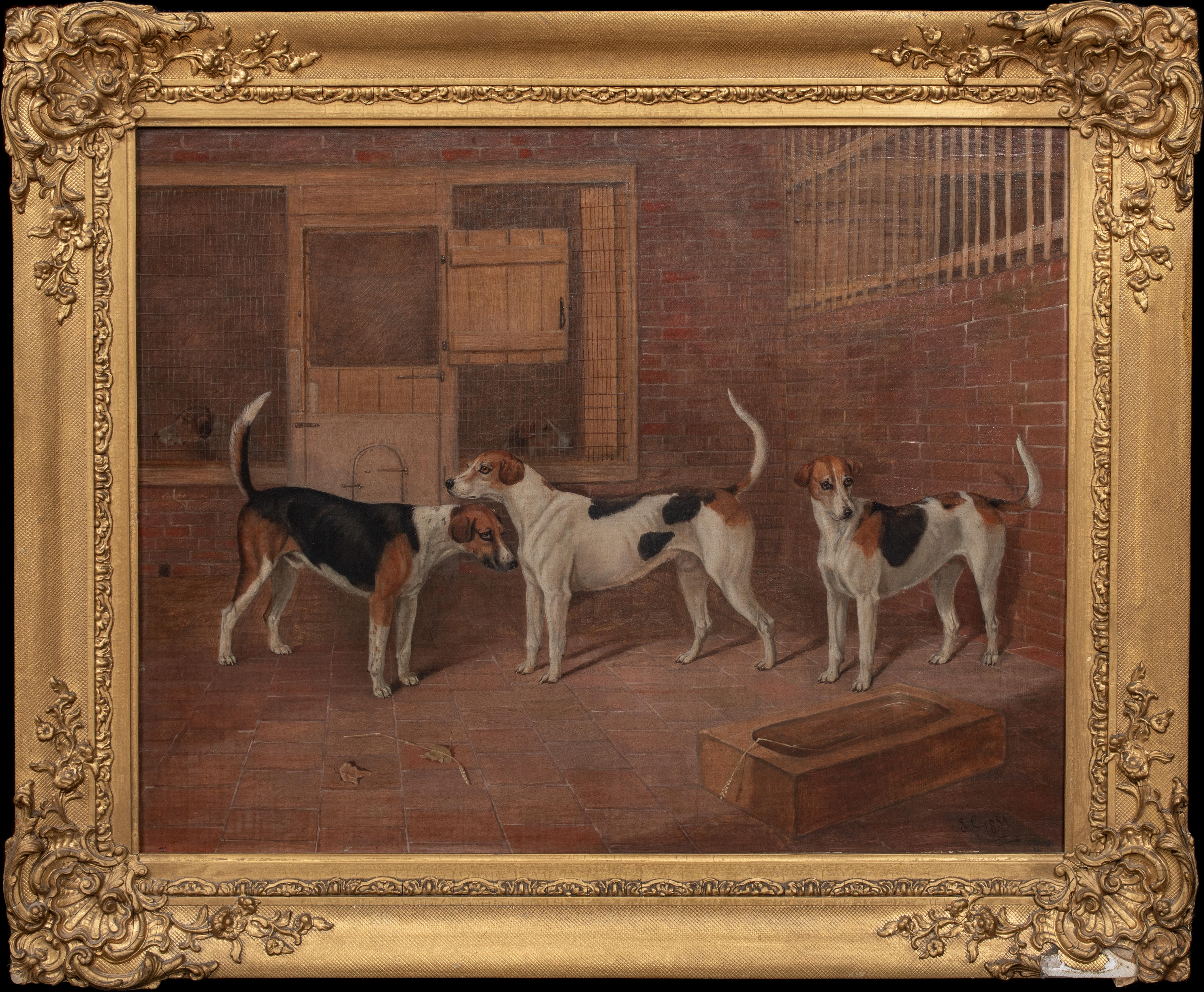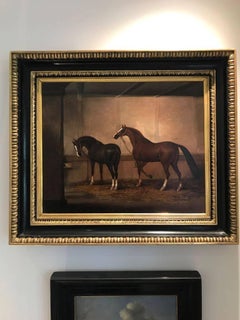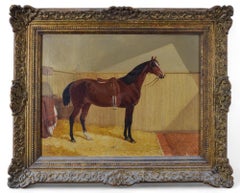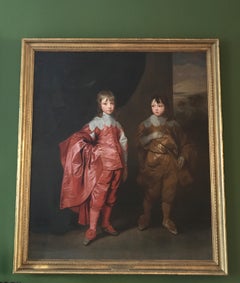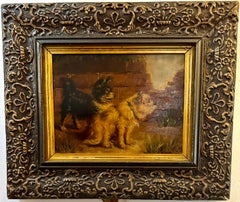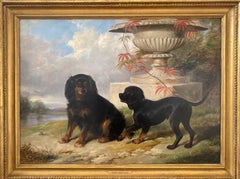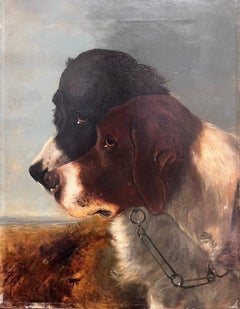Items Similar to 19th Century Portrait of Jerry and Dot a Pair Two Naughty Friends
Want more images or videos?
Request additional images or videos from the seller
1 of 5
Imogen Mary Collier19th Century Portrait of Jerry and Dot a Pair Two Naughty Friends
$11,071.97
£8,000
€9,460.03
CA$15,155.10
A$16,974.51
CHF 8,832.40
MX$206,154.22
NOK 111,972.40
SEK 105,654.30
DKK 70,585.27
Shipping
Retrieving quote...The 1stDibs Promise:
Authenticity Guarantee,
Money-Back Guarantee,
24-Hour Cancellation
About the Item
Imogen Mary Collier (1873-1952)
Portrait of Jerry and Dot
Circa. 1895-1900
Oil on Canvas
49 X 42.5
Imogen Mary Collier (1873-1952) was born in 1873 at Whitchurch, Devon, England. She was the daughter of Mortimer John Collier and Sophia Luddington Whipple. Known by the family as Dena, she lived her life in the family home “Foxhams” built by her father some years before in Horrabridge on the edge of Dartmoor. The family included painters of note, one of her uncles was A.B. Collier a well known West Country artist and another The Honourable John Collier, a painter and writer on art. Further her mother’s friend was Lady Elizabeth Butler, (painter of Scotland for Ever and other well known paintings), so surrounded as she was by artists and horses it is not surprising that her life followed a certain course. Dena’s mother Sophy was known to drive a trap, of unspecified type, with some skill and speed around the local district and the stud at Foxhams was thought to have come into being in 1888 when Dena was about fifteen. Later Collier studied art at the well known school founded by Mr. W. Frank Calderon, (son of Philip R.A.) The School of Animal Painting, in Baker Street, which no longer exists. His best known painting was the, Horse Fair (Royal Academy 1894). A fellow student at the school was Lionel Edwards. Collier carried off two art scholarships, (details are unknown), but she is believed to have spent some time in Paris where the family say she knew Gwen John, sister to Augustus John. She also journeyed to Egypt and India, leaving paintings of camels as well as ponies to be enjoyed. Collier had two painting’s hung in the Royal Academy: 1899 In the Old Barn and 1904 Rocket - weight-carrying hunter at grass. Further she painted two presentation pictures, one of the late Mr Masheter, Master of the Essex Hunt and one of the late Mr Penn Sherbrook, Master of the Synington (Yorks) Hunt. She also painted several famous racing ponies for Baroness Burton of Douchfour Inverness.
About the Seller
5.0
Vetted Professional Seller
Every seller passes strict standards for authenticity and reliability
Established in 1990
1stDibs seller since 2017
42 sales on 1stDibs
- ShippingRetrieving quote...Shipping from: London, United Kingdom
- Return Policy
Authenticity Guarantee
In the unlikely event there’s an issue with an item’s authenticity, contact us within 1 year for a full refund. DetailsMoney-Back Guarantee
If your item is not as described, is damaged in transit, or does not arrive, contact us within 7 days for a full refund. Details24-Hour Cancellation
You have a 24-hour grace period in which to reconsider your purchase, with no questions asked.Vetted Professional Sellers
Our world-class sellers must adhere to strict standards for service and quality, maintaining the integrity of our listings.Price-Match Guarantee
If you find that a seller listed the same item for a lower price elsewhere, we’ll match it.Trusted Global Delivery
Our best-in-class carrier network provides specialized shipping options worldwide, including custom delivery.More From This Seller
View AllSir Richard Sutton's Most Famous Hunter Hotspur
By Claude-Lorraine Ferneley
Located in London, GB
Claude-Lorraine Ferneley
Sir Richard Sutton's Most Famous Hunter Hotspur
c.1840
24 X 28.5 inches framed
A genuinely famous hunter! Even mention in...
Category
1840s Animal Paintings
Materials
Oil
18th Oil Painting Horses Feeding at the Stables
By James Seymour
Located in London, GB
James Seymour (1702–1752)
Feeding Time in the Stables
Oil on canvas
32 x 38 inches inc. frame
Provenance: Private Collection, Lambourn
James Seymour (1702–1752) was an English painter, widely recognized for his equestrian art.
Seymour was born in London. His father was an amateur artist and art dealer, whose other business dealings (as a banker, goldsmith, and diamond merchant) afforded young Seymour the leisure time to study art on his own, either his father's or the art at the Virtuosi Club of St. Luke - a gentleman's club his father belonged to, specializing in art. In a short time the boy was a self-taught artist, familiar with many of the prominent artists of the period.
Seymour's love of art was matched only by his love of horses. He began spending time at racetracks early on, and before long found himself absorbed in the sport - drawing, painting, owning, breeding, and racing horses. His art proved popular among the prominent sporting families of the day, eventually garnering Seymour patrons in Sir William Jolliffe and Charles Seymour, 6th Duke of Somerset...
Category
18th Century Old Masters Animal Paintings
Materials
Oil
Saddled bay hunter horse Oil on canvas British 1863
Located in London, GB
Benjamin Herring Snr (British, 1830-1871)
Saddled bay hunter
1863
Oil on canvas
With old Christie's stencil verso
Property of a gentleman
From the collection of Peter Roe
Dimension...
Category
18th Century English School Animal Paintings
Materials
Oil
Double Portrait Oil Painting Brothers George, 2nd Duke Buckingham & Lord Francis
By (After) Anthony Van Dyck
Located in London, GB
Aftrer Anthony VAN DYCK - maybe Studio (1599, Antwerp – 1641, London) Flemish
Double Portrait of George Villiers, 2nd Duke of Buckingham (1628-1687) & Lord Francis Villiers (1629-1648)
Oil on Canvas
170 x 147 cm
Anthony Van Dyck (1599-1641)
No painter has done more to define an era than Anthony van Dyck. He spent only seven and a half years of his short life (1599- 1641) in England. He grew up in Antwerp, where his precocious talent was recognised by Peter Paul Rubens, the greatest painter of his age. He worked in Rubens’s studio and imitated his style as a religious artist, painting biblical scenes redolent of the lush piety of the counter-reformation. But soon he was on the move. In 1620, he visited London for a few months, long enough to paint a history picture, The Continence of Scipio, for the royal favourite, George Villiers, Marquess of Buckingham, and a portrait of his other English patron, the great art collector, Thomas Howard, 2nd Earl of Arundel.
After a stint in Italy, making imposing portraits of the wealthy aristocracy and sketching and copying works by Titian, he returned to the Spanish Netherlands in 1627, becoming court artist to Archduchess Isabella before departing for The Hague in 1631 to paint the Dutch ruler Frederick Henry, Prince of Orange. Charles I’s invitation in 1632 led Van Dyck back to London where he was knighted, paid an annual salary of £200 and installed in a house in Blackfriars with a special jetty at which the royal barge might tie up when the King was visiting his studio. By this time Van Dyck was recognised as the leading court painter in Europe, with Velazquez at the court of Philip IV of Spain his only rival. He also excelled as a superbly observant painter of children and dogs.
Van Dyck’s notoriety in depicting children led to the introduction of groups of children without their parents as a new genre into English painting (amongst other new genres).
For the next 300 years, Van Dyck was the major influence on English portraiture. Nearly all the great 18th Century portraitists, from Pompeo Batoni and Allan Ramsay to Thomas Gainsborough and Joshua Reynolds, copied Van Dyck’s costumes, poses and compositions.
George Duke of Buckingham & his brother Francis Villiers
Painted in 1635, this double portrait was originally commissioned by Charles I, who raised the two brothers after their father, George Villiers, was assassinated in 1628. Together with their sister, Lady Mary Villiers, they enjoyed the King’s favour absolutely. Francis whose absolute ‘inimitable handsomeness’ was noted by Marvell (who was killed in a skirmish near Kingston upon Thames). The young duke who commanded a regiment of horse at the Battle of Worcester, remained closely associated with Charles II, held a number of high offices after the Restoration and was one of the most cynical and brilliant members of the King’s entourage, immortalised as ‘Zimri’ in Dryden’s Absalom and Achitopbel. As a young man he had sold his father’s great collection of pictures in the Spanish Netherlands, many of them to the Archduke Leopold Willhelm.
Painted for Charles I and placed near the portrait of their sister in the Gallery at St James’ Palace. The handling of both costumes is very rich, and the heads are very carefully and sensitively worked. That of the younger boy in particular is more solidly built up than the lower part of the figure. A preparatory drawing for the younger boy is in the British Museum.
There are copies at, e.g., Highclere Castle...
Category
17th Century Old Masters Portrait Paintings
Materials
Oil
18th Century Oil Painting Portrait of Phillip, 6th Viscount Wenman.
By Nathaniel Dance-Holland
Located in London, GB
Sir Nathaniel Dance-Holland (1750-1811) was an English portrait painter and one of the founding members of the Royal Academy in 1768. Justly celebrated in his lifetime he won several...
Category
Late 18th Century Old Masters Portrait Paintings
Materials
Oil
18th Century Neoclassical Oil Painting of the Trojan War: Briseis & Achilles
By James Thornhill
Located in London, GB
James Thornhill (1674-1735)
Oil on canvas
12 x 14 inches;
16 ½ x 18 ½ in. Inc. frame
The subject matter and inclusion of herms on both sides shows the influence of Louis...
Category
Early 18th Century Old Masters Figurative Paintings
Materials
Canvas, Oil
You May Also Like
English early 20th century portrait of two dogs, terriers in a landscape
By Lilian Cheviot
Located in Woodbury, CT
Investing in a late 20th-century Victorian-style portrait of two terrier dogs in a landscape is an opportunity to bring a touch of nostalgic charm and timeless elegance into your liv...
Category
1980s Victorian Animal Paintings
Materials
Wood, Oil
English 19th century portrait of Lord Methuen's favourite dogs
By William Barraud
Located in Bath, Somerset
A painting of Lord Methuen’s Spaniels Gipsy and Fairy, by William Barraud, standing beside a classical urn in a landscape by a lake, probably in the grounds of Corsham Court in Wiltshire, the Methuen family country seat. Signed and dated 'W Barraud...
Category
19th Century English School Animal Paintings
Materials
Canvas, Oil
19th Century English Victorian Portrait of Two Dogs in a Field Oil Painting
Located in Cirencester, Gloucestershire
Portrait of Two Dogs
English artist, mid 19th century
oil on canvas, unframed
Canvas: 18 x 14 inches
Provenance: Private collection, England
Condition: The painting is in good condit...
Category
Mid-19th Century Victorian Animal Paintings
Materials
Oil
19th century Irish or English Antique portrait of two dogs, waterdogs
Located in Woodbury, CT
Outstanding portrait of two dogs.
Sam Spode was an Irish painter of horse and dog portraits from the late 18th century through the early 19th century. His dog portraits are very rar...
Category
1830s Folk Art Animal Paintings
Materials
Canvas, Oil
$9,200 Sale Price
20% Off
Free Shipping
19th Century dog portrait oil painting of two show dogs
By Valentine Thomas Garland
Located in Nr Broadway, Worcestershire
Valentine Thomas Garland
British, (1845-1914)
After the Show
Oil on canvas, signed
Image size: 28.5 inches x 18.5 inches
Size including frame: 40.75 inches x 30.75 inches
A wonderf...
Category
19th Century Victorian Animal Paintings
Materials
Canvas, Oil
Shiner Primrose & Princess, 19th Century by EDWARD CORBET (1815-1899)
Located in Blackwater, GB
Shiner Primrose & Princess, 19th Century
by EDWARD CORBET (1815-1899)
Large 19th Century portrait of New Forest Foxhounds Shiner Primrose and Princess, oil on canvas by Edward Cor...
Category
19th Century Animal Paintings
Materials
Canvas, Oil
$3,210 Sale Price
20% Off
More Ways To Browse
The Horse Fair
Devon England
Mary Frank Art
19th Century Painting India
Animal Camel
1888 Oil Portraits
Naughty Art
Camel Painting
Sister Mary
John Augustus
Antique Collier
Pair Of 19th Century Oil Portraits
John Edwards
Pair 19th Century Oil Portrait Paintings
John Collier
R Frank Oil Painting
Horse Lady Painting
Mary Hunter
